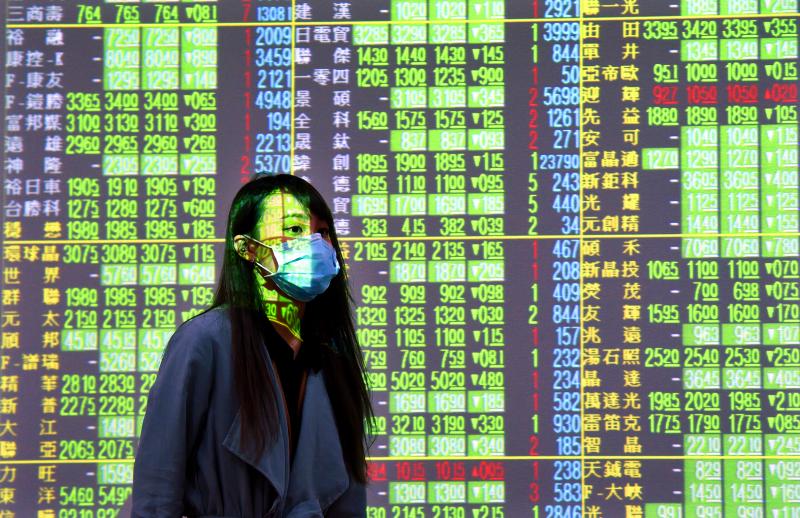The TAIEX yesterday retreated 5.83 percent to close at 8,681.34 points, the lowest in 42 months, as foreign and domestic institutional investors continue a sell-off amid the escalating worldwide spread of COVID-19, analysts said.
The benchmark index opened down 133.39 points at 9,085.28 — which was lower than the 10-year moving average of 9,110 points — and continued falling by a total of 695 points in the early morning session, before slowly rebounding to close down 537.33 points at the end of trading, Taiwan Stock Exchange (TWSE) data showed.
The TAIEX has fallen 28 percent from its peak of 12,179 points, registered on Jan. 14, a considerable and rarely seen drop, but analysts said that they could not predict the bottom for the market, given the ongoing spread of the coronavirus.

Photo: Liao Chen-huei, Taipei Times
“The deterioration in the local equity market could be attributed to sell-offs by foreign and domestic institutional investors. There will likely be a turning point once they stop selling, but it is hard to forecast when,” Capital Investment Trust Corp (群益投信) fund manager Daniel Tsai (蔡彥正) told the Taipei Times by telephone yesterday.
“Cash is king now. Institutional investors would prefer to decrease their holdings of risky assets, as they predict their value to decline amid volatile trading,” Tsai said.
Besides taking the “flight-to-quality” action, some institutional investors sold local shares after a computer-activated trading tool unleashed stop-loss orders when prices of stocks they bought earlier had declined more than 30 percent, Tsai said.
As the New Taiwan dollar yesterday weakened against the US dollar, it seemed that some foreign investors immediately moved funds out of Taiwan after selling local equities, partially to support their fund management businesses, he said.
Foreign institution investors yesterday sold a net NT$21.22 billion (US$695.6 million) of local shares, slightly down from the average of NT$28 billion they sold over the previous three days.
It would still take days to observe if the sell-offs would ease, he said.
Domestic securities investment trust companies also sold a net of NT$700 million of local shares, up from the previous three day’s average of NT$209 million, TWSE data showed.
“Quantitative easing monetary policy, rate cuts and expansionary fiscal policy would be a bit helpful, but not very likely to alter the trend. People do not lack funds, but they need to see effective treatments for COVID-19 before regaining confidence in the global economy,” Tsai said.

UNCERTAINTY: Innolux activated a stringent supply chain management mechanism, as it did during the COVID-19 pandemic, to ensure optimal inventory levels for customers Flat-panel display makers AUO Corp (友達) and Innolux Corp (群創) yesterday said that about 12 to 20 percent of their display business is at risk of potential US tariffs and that they would relocate production or shipment destinations to mitigate the levies’ effects. US tariffs would have a direct impact of US$200 million on AUO’s revenue, company chairman Paul Peng (彭雙浪) told reporters on the sidelines of the Touch Taiwan trade show in Taipei yesterday. That would make up about 12 percent of the company’s overall revenue. To cope with the tariff uncertainty, AUO plans to allocate its production to manufacturing facilities in

TAKING STOCK: A Taiwanese cookware firm in Vietnam urged customers to assess inventory or place orders early so shipments can reach the US while tariffs are paused Taiwanese businesses in Vietnam are exploring alternatives after the White House imposed a 46 percent import duty on Vietnamese goods, following US President Donald Trump’s announcement of “reciprocal” tariffs on the US’ trading partners. Lo Shih-liang (羅世良), chairman of Brico Industry Co (裕茂工業), a Taiwanese company that manufactures cast iron cookware and stove components in Vietnam, said that more than 40 percent of his business was tied to the US market, describing the constant US policy shifts as an emotional roller coaster. “I work during the day and stay up all night watching the news. I’ve been following US news until 3am

COLLABORATION: Given Taiwan’s key position in global supply chains, the US firm is discussing strategies with local partners and clients to deal with global uncertainties Advanced Micro Devices Inc (AMD) yesterday said it is meeting with local ecosystem partners, including Taiwan Semiconductor Manufacturing Co (TSMC, 台積電), to discuss strategies, including long-term manufacturing, to navigate uncertainties such as US tariffs, as Taiwan occupies an important position in global supply chains. AMD chief executive officer Lisa Su (蘇姿丰) told reporters that Taiwan is an important part of the chip designer’s ecosystem and she is discussing with partners and customers in Taiwan to forge strong collaborations on different areas during this critical period. AMD has just become the first artificial-intelligence (AI) server chip customer of TSMC to utilize its advanced

Six years ago, LVMH’s billionaire CEO Bernard Arnault and US President Donald Trump cut the blue ribbon on a factory in rural Texas that would make designer handbags for Louis Vuitton, one of the world’s best-known luxury brands. However, since the high-profile opening, the factory has faced a host of problems limiting production, 11 former Louis Vuitton employees said. The site has consistently ranked among the worst-performing for Louis Vuitton globally, “significantly” underperforming other facilities, said three former Louis Vuitton workers and a senior industry source, who cited internal rankings shared with staff. The plant’s problems — which have not